Meckel's diverticulectomy - series
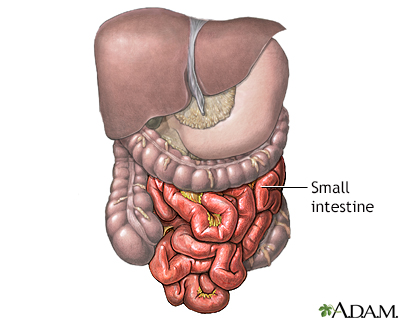
Normal anatomy
The small intestine is the longest portion of the digestive tract. It runs from the stomach to the colon.
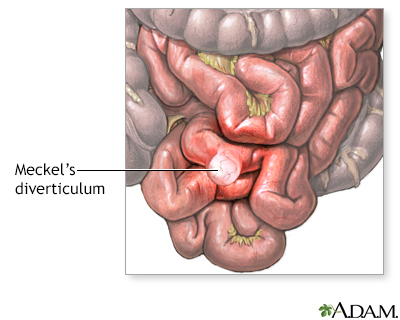
Indications
Meckel's diverticulum is one of the most common congenital abnormalities. It occurs when the connection between the intestine and the umbilical cord doesn't completely close off during fetal development. This results in a small outpouching of the small intestine, know as a Meckel's diverticulum.
In most cases, Meckel's diverticula do not cause any problems. In a small number of patients however, these diverticula can become infected (diverticulitis) cause an obstruction of the intestine, or cause bleeding from the intestine. The most common symptom of Meckel's diverticulitis is painless bleeding from the rectum. The stools may contain fresh blood or may look black and tarry. Diverticulitis, or infection, of a Meckel's diverticulum is often mistaken for appendicitis.
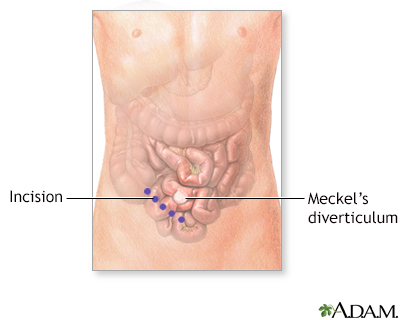
Incision
Treatment of a Meckel's diverticulum involves resection of the involved portion of the small intestine. Often, symptoms from a Meckel's diverticulum are thought to be due to appendicitis and the Meckel's diverticulum is discovered only after the operation has begun. While the patient is deep asleep and pain-free (general anesthesia), an incision is made in the right side of the lower abdomen.
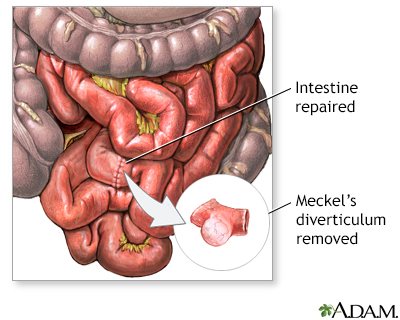
Procedure
The small intestine is found and the Meckel's diverticulum is removed. The intestine is repaired and the incision is closed.
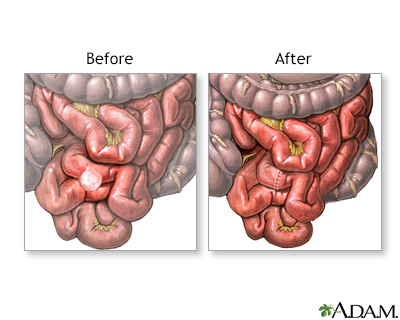
Aftercare
Intravenous fluids will be given until the patient is able to eat by mouth (after bowel sounds are heard). A nasogastric tube may be in place to empty the stomach. Antibiotics may be given to prevent or treat infection. Discharge from the hospital can be expected within a week after surgery, barring complications.
Related Information
Meckel diverticulumMeckel diverticulectomy
BACK TO TOP
Review Date: 11/2/2022
Reviewed By: Michael M. Phillips, MD, Emeritus Professor of Medicine, The George Washington University School of Medicine, Washington, DC. Also reviewed by David C. Dugdale, MD, Medical Director, Brenda Conaway, Editorial Director, and the A.D.A.M. Editorial team.

Health Content Provider
06/01/2025
|
A.D.A.M., Inc. is accredited by URAC, for Health Content Provider (www.urac.org). URAC's accreditation program is an independent audit to verify that A.D.A.M. follows rigorous standards of quality and accountability. A.D.A.M. is among the first to achieve this important distinction for online health information and services. Learn more about A.D.A.M.'s editorial policy, editorial process and privacy policy. A.D.A.M. is also a founding member of Hi-Ethics. This site complied with the HONcode standard for trustworthy health information from 1995 to 2022, after which HON (Health On the Net, a not-for-profit organization that promoted transparent and reliable health information online) was discontinued. |
The information provided herein should not be used during any medical emergency or for the diagnosis or treatment of any medical condition. A licensed medical professional should be consulted for diagnosis and treatment of any and all medical conditions. Links to other sites are provided for information only -- they do not constitute endorsements of those other sites. © 1997- 2024 A.D.A.M., a business unit of Ebix, Inc. Any duplication or distribution of the information contained herein is strictly prohibited.
